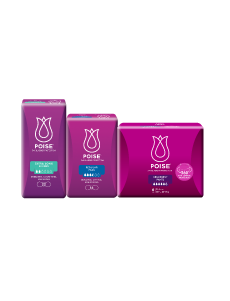Confidence and Menopause
Women’s bodies experience many changes in life from pregnancy to menopause and with each change comes new little challenges that women need to overcome. From hot flushes to mood swings to light bladder leakage, menopause really does put a women through her paces and the hormonal changes can often impact her confidence.
So, you have a beautiful family who you’re proud of, you’ve got a successful career, and you’ve finally started to feel like you’re getting the hang of living like the confident woman you were born to be. But, right out of nowhere, life decides to throw you a curve ball that you weren’t really anticipating - or let’s be honest, one you’ve chosen to not ever properly think about.
We can only really be talking about one thing. That’s right, you guessed it. We’re talking about that new phase in a mature woman’s life called menopause. Not only does menopause affect your body physically, it also impacts a woman’s confidence and can be tough to navigate when everything seems to be a challenge.
With hot flushes, mood swings, and irregular bleeding, menopause can also have an impact on your hormone levels and cause light bladder leakage or menopause incontinence. As if coming to terms with what many other women describe as their “womanhood” slowly evaporating isn’t difficult enough!
There can be a lot of apprehension when it comes to knowing what’s in store once menopause starts and as a result women’s confidence can be impacted dramatically. With physical factors including weight gain, potential hair loss, dry skin and light bladder leakage it can be a confusing time for women. The emotional aspects of menopause are also tough, dealing with stereotypes of what reaching the menopause means, the changes in your body and how you can best control them and the hormonal changes are all big factors in the loss of confidence.
If left untreated, it’s common for light bladder leakage or menopause incontinence to interfere with all aspects of your lifestyle and ultimately your confidence - whether that be work, social activities and sexual and personal relationships. Many women however do not reach out for help, as there’s wrongfully a cloud of shame that’s associated with the condition. The good news though is light bladder leakage or menopause incontinence can be managed and treated.
Sometimes, the best way to cope with menopause incontinence is knowing that you’re not alone. We, as women, should be in this together, especially as 40% of menopausal women are estimated to suffer from this condition. It is nothing to be embarrassed about!
There are a number of things that can be done to help boost confidence and tackle some of those symptoms.
Exercise – not only will gentle exercise such as Pilates help offset the weight gain, it can also help with other symptoms too, such as Light Bladder Leakage and can help boost confidence and mental wellbeing. Pilates is also a great way to help strengthen your pelvic floor muscles!
Be positive – menopause is just another challenge in life that you can beat. Staying positive and empowering yourself is essential. Don’t forget to talk to other women as well – there’s an old saying a problem shared is a problem halved and so you may realise that you’re not alone in some of the daily challenges you’re experiencing. There are going to be many benefits once menopause is over so focus on the positives such as increased freedom and new life challenges to be embraced. If you can beat menopause, you can do anything!
POISE® has a wide product offering of Liners and Pads that are all specially designed to help light bladder leakage protection and pregnancy incontinence care. It is 2X more absorbent than period products, but all in a discreet manner and by keeping you comfortable.
To learn more about the products available, and find the right product for you, visit our POISE® products page.
Where To Buy
These articles might also be interesting to you
Kimberly-Clark Singapore makes no warranties or representations regarding the completeness or accuracy of the information. This information should be used only as a guide and should not be relied upon as a substitute for professional medical or other health professional advice.
Sources
Arnold, J., McLeod, N., Thani-Gasalam, R. and Rachid, P. (2012). RACGP - Overactive bladder syndrome –management and treatment options. [online] Racgp.org.au. Available at:
http://www.racgp.org.au/afp/2012/november/overactive-bladder-syndrome/
[Accessed 6 Apr. 2015].
Bladderclinic.com.au, (2011). Overactive Bladder (OAB). [online] Available at:
http://www.bladderclinic.com.au/bladder/overactive-bladder-oab [Accessed 6 Apr. 2015].
Cherney, K. (2013). Home Remedies for Overactive Bladder. [online] Healthline. Available at:
http://www.healthline.com/health/overactive-bladder/home-remedies#Overview1
[Accessed 6 Apr. 2015].
Eilber, MD, K. (2015). What Is The Difference Between A Small Bladder And An .... [online] EmpowHER. Available at:
http://www.empowher.com/overactive-bladder/content/what-difference-between-small-bladder-and-overactive-bladder-dr-
[Accessed 6 Apr. 2015]
Maher, MD, C. (2003). Welcome to Chris Maher's Urogynaecology Australia Web Site. [online] Urogynaecology.com.au. Available at:
http://www.urogynaecology.com.au/Overactive.htm [Accessed 6 Apr. 2015].
Siamak N. Nabili, M. (2014). Overactive Bladder: Facts for Men, Women, and Children. [online] MedicineNet. Available at:
http://www.medicinenet.com/overactive_bladder/article.htm [Accessed 6 Apr. 2015].
Tidy, MD, C. (2013). Overactive Bladder Syndrome, Bladder Problems | Health | Patient.co.uk. [online] Patient.co.uk. Available at:
http://www.patient.co.uk/health/overactive-bladder-syndrome [Accessed 6 Apr. 2015].
Webmd.com, (2014). Overactive Bladder in Children (Child Incontinence): Signs, Causes, and Treatment. [online] Available at:
http://www.WebMD.com/urinary-incontinence-oab/overactive-bladder-in-children
[Accessed 6 Apr. 2015].
Canceraustralia.gov.au, (2019). Bladder cancer statistics in Australia | Bladder Cancer. [online] Available at:
https://bladder-cancer.canceraustralia.gov.au/statistics
[Accessed 6 Jun. 2019].
Other urinary incontinence causes








